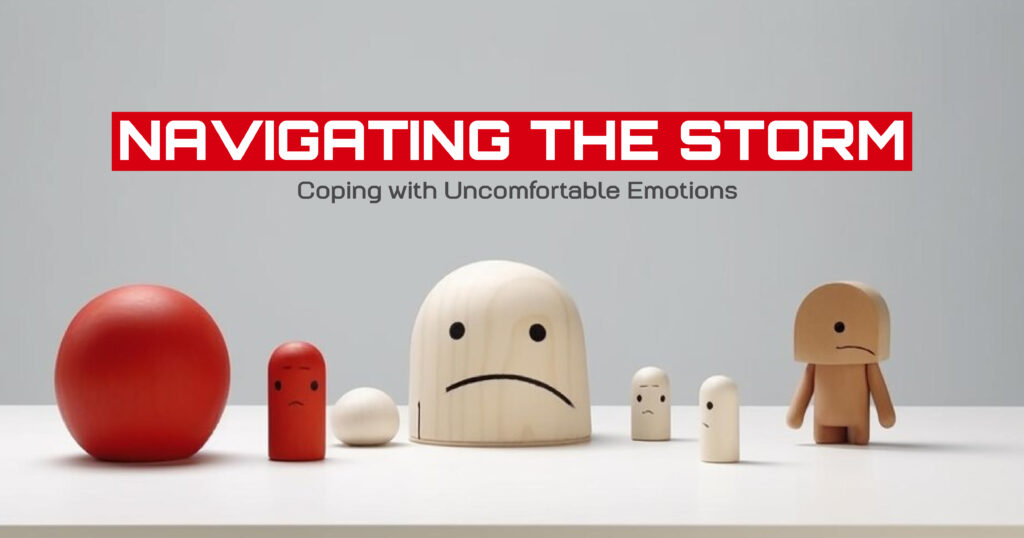
At some point in our lives, we all encounter uncomfortable emotions that leave us feeling unsettled and overwhelmed. These emotions can range from anxiety and sadness to anger and frustration. However, it is important to remember that while these emotions may be uncomfortable, they are also an integral part of our personal growth and self-discovery journey.
Understanding and coping with these uncomfortable emotions is crucial for our mental well-being. In this article, we will explore effective strategies to help you navigate the storm of uncomfortable emotions, embrace self-growth, and come out stronger on the other side.
Acknowledging and Identifying Uncomfortable Emotions
Before we can effectively cope with uncomfortable emotions, it is crucial to acknowledge and identify them. Here are a few steps to help you:
- Pause and Reflect: Take a moment to pause and reflect on the emotions you are experiencing. Allow yourself to sit with them and acknowledge their presence without judgment.
- Explore the Root Cause: Dive deeper into the root cause of these emotions. Are they triggered by external events or internal struggles? Understanding the source can provide valuable insights for coping.
- Label Your Emotions: Give your emotions a name. Are you feeling anxious, overwhelmed, or disappointed? By labeling your emotions, you gain a sense of awareness that can help you address them effectively.
Weathering the Storm: Coping Strategies for Uncomfortable Emotions
Now that we have acknowledged and identified our uncomfortable emotions, let’s explore practical coping strategies to navigate through them:
1. Practice Mindfulness
By practicing mindfulness, we can learn to observe our emotions without judgment. Mindfulness allows us to become aware of our feelings, thoughts, and bodily sensations, creating a space for introspection and acceptance. Some techniques to incorporate mindfulness into your coping toolkit include:
- Mindful Breathing: Take a few minutes each day to focus on your breath. Observe the sensations as you inhale and exhale, allowing your mind to settle into the present moment.
- Body Scan Meditation: Scan your body from head to toe, paying attention to any areas of tension or discomfort. Notice how your emotions manifest physically and learn to release any tension through deep breathing and relaxation techniques.
2. Practice Emotional Regulation
Emotional regulation involves understanding and managing your emotions in a healthy and productive way. Here are some techniques to help you regulate your emotions effectively:
- Identify Triggers: Understand the situations or events that trigger your uncomfortable emotions. By recognizing these triggers, you can develop strategies to avoid or navigate them more effectively.
- Expressive Writing: Journaling can serve as a therapeutic outlet for your emotions. Set aside time each day to write freely about your feelings, allowing yourself to release any pent-up emotions.
3. Seek Support
Never underestimate the power of seeking support from loved ones or professionals. They can provide a safe space for you to express your emotions and offer valuable guidance on coping strategies. Consider the following options:
- Friends and Family: Reach out to trusted friends or family members who can provide empathy, guidance, and a listening ear.
- Therapy or Counseling: If your uncomfortable emotions persist or become overwhelming, consider seeking professional help from therapists or counselors who specialize in emotional well-being.
FAQs
Q1: Can suppressing my uncomfortable emotions be harmful?
While it may seem tempting to suppress your uncomfortable emotions, doing so can lead to long-term negative effects on your mental and physical well-being. It is important to acknowledge, process, and express your emotions in healthy ways.
Q2: How long does it typically take to cope with uncomfortable emotions?
Coping with uncomfortable emotions is a personal journey, and the duration can vary from person to person. Allow yourself the time and patience needed to heal and grow through the process.
Q3: Are there any alternative therapies that can help with coping?
Yes, various alternative therapies like yoga, meditation, art therapy, and nature walks can aid in coping with uncomfortable emotions. Explore different modalities that resonate with you.
Ron and his staff went above and beyond to help our son and family. Ron genuinely cares about the clients living at Into The Light. He even hosted a special Christmas dinner for them understanding they were away from family! Ron and his staff listen to clients and their families and work with their needs. – Nicole Foster
In conclusion, navigating uncomfortable emotions is a challenging yet essential aspect of personal growth. By acknowledging and identifying these emotions, practicing mindfulness, regulating emotions effectively, and seeking support, you can weather the storm and emerge stronger on the other side.
Remember, discomfort is often a catalyst for growth. Embrace the opportunity to learn more about yourself, cultivate resilience, and create a brighter future. You have the power to navigate through any emotional storm that comes your way. Into the Light is an outpatient treatment program for men in need of mental health support and life skills development. Our staff of instructors and therapists is dedicated to helping our patients develop the tools, skills, and capabilities necessary for maintaining wellness and stability. Our program offers individualized care plans and group classes geared toward improving communication and critical thinking, goal setting, self-esteem development, and relationship building.




